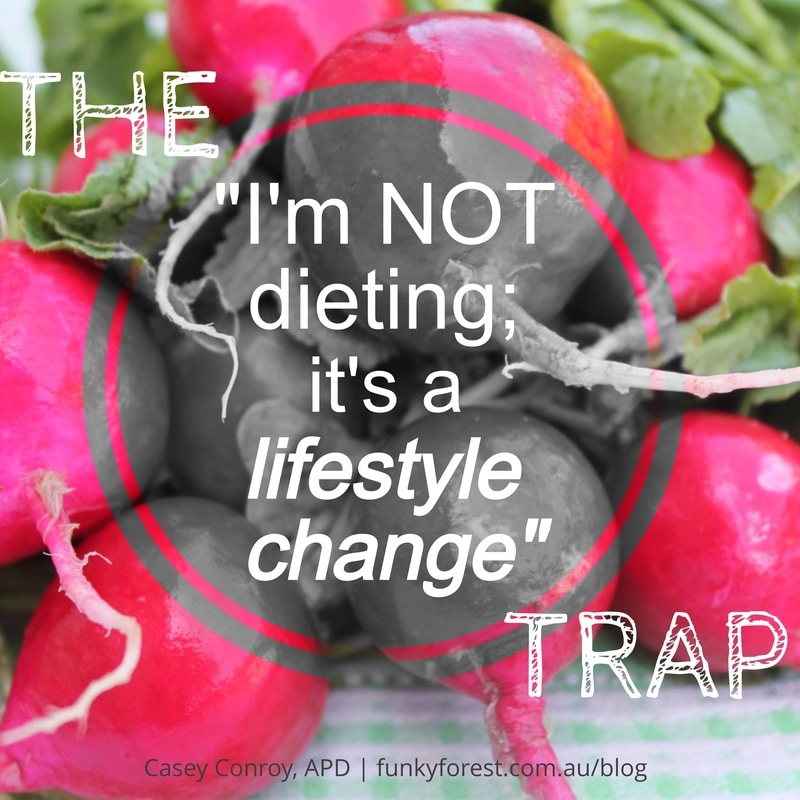"It's not dieting, it's a lifestyle change."
So let's be super clear: Dieting is any approach to food and eating that is centred around weight loss or weight control.
The roots of dieting are diet mentality, and diet mentality is fertilised by diet culture. And no matter how abusive dieting is to our bodies or our minds, millions of people continue to cling to it.
It can be easy to think you're not dieting, even if you are. So here I'll list three main types of diets so you know what you're looking for when it comes to slaying that diet mentality.
3 Types of diets
1. Old School Diets
Unlike the form of hip-hop with the same name, old school dieting is sadly not something that makes you want to put your hands in the air like you just don't care. These diets are pretty easy to spot, and they don't attempt to hide the fact that their primary if not only purpose is weight reduction.
Most old school diets them have been around for decades and may conjure up images of dusty shelves in op-shops containing retro diet books. Examples include:
- Weigh-in group-based programs like Weight Watchers and Jenny Craig
- Atkins (i.e. old school paleo)
- The natural hygienist movement (i.e. old school clean eating / detox dieting)
- “Fad diets” like grapefruit diets, cabbage soup diets, or the Master Cleanse.
Old School dieting is currently experiencing a decline in popularity as it becomes increasingly replaced by "lifestyle" dieting...
2. "Lifestyle" Diets
I was recently challenged by an annoyed reader on my Facebook page after posting this blog in reference to the modern form of dieting we are surrounded by these days - the kind that is disguised as health-promoting. "Haven't you heard of lifestyle change?" was the crux of the person's comment, but it was quickly deleted by said person after I posted this response:
There’s lifestyle change centred around health-promoting behaviours for the sake of health, and then there’s “lifestyle change” centred around dietary manipulation for the sake of weight loss. This is dieting, and it is harmful.
Lifestyle diets are trendy and typically advocated by sexy, healthy-looking celebrities who often don't have any formal qualifications in nutrition. Examples of lifestyle diets include:
- the cyclical dieting and/or over-exercise promoted by multilevel marketing companies (think Juice Plus, Isagenix, Herbalife)
- a way of eating such as clean eating, paleo (and specific versions of paleo such as Whole30), raw (and variants including 80:10:10), and forms of intermittent fasting including 5:2 and 16:8
- long term "healing diets" (such as GAPS, SCD, low FODMAPs, gluten-free) that are not strictly supervised by a medical professional... and, more importantly, are adhered to with any degree of intention of desiring weight control. (See my free email series on avoiding the pitfalls in elimination diets if you want to know more about this.)
Following lifestyle diet plans such as I Quit Sugar or Whole30 or some other trendy eating plan doesn’t teach you how to be a competent, intuitive eater. In reality, those sexy-sounding eating plans just teach you how to restrict. Sure, you may feel better if you are taking time to plan and cook meals with whole foods while on Whole30. But that doesn’t mean you have to completely eliminate other foods or that your body can’t process certain foods.
3. Emotional dieting
This occurs when you aren’t actively sticking to a specific diet as such, but you are emotionally attached to food in terms of what you eat and don’t eat. This can happen even if you;re not physically restricting your food. As soon as we turn food into a moral issue, or rather a moral failing (i.e. "I can’t believe I just ate that… what’s wrong with me?!"), we are emotionally dieting.
And emotional dieting induces the same physical, mental, and emotional damage that dieting with actual food restriction or manipulation brings.
No matter which form of dieting a person may identify with, people who wish to control their weight through their eating become very attached to their food rules and their outcomes, their programs and their restrictions, their weight loss at all costs – often at high cost to their mental, emotional, and physical health, not to mention their wallets.
It's really important that we all get clear on what dieting looks like. Understand what diet mentality sounds like, and learn to recognise the dieting behaviours you may partake in.
You may be surprised just how prevalent dieting still is - even when it's disguised as a lifestyle change that will "slim your waistline and fatten your wallet" as in the case of diet products sold by multilevel marketing companies.
Only once we get real and honest about what diet thoughts and behaviours we are personally invested in, can we really do the work of slaying the diet mentality and shifting to a new, far more health-promoting paradigm.
Are you ready to finally slay the diet mentality? If so, you'll want to check out this blog on 7 ways to slay that MF beast.



































 RSS Feed
RSS Feed



